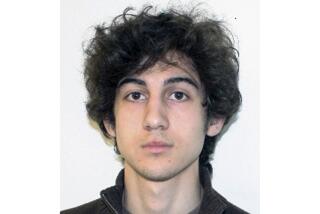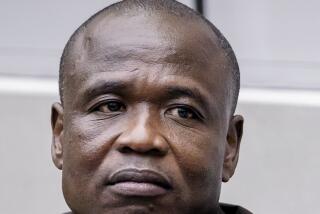In reversal, military judge agrees to one trial for Sept. 11 defendants
An Army judge at Guantanamo Bay reversed himself Wednesday, deciding that all five Sept. 11 defendants would be tried together after prosecutors objected that a separate trial for one would be too much for victims to bear.
But the judge, Army Col. James Pohl, added that he was troubled by the continuing delays in the case and indicated that he might change his mind again because he was “concerned about the pace of play.”
“I’ve spent time on this issue,” he said in a rare bench ruling from the prison courtroom at Guantanamo Bay, Cuba, simulcast for the media at Ft. Meade in Maryland. “I’ve thought about it extensively. The government’s request for reconsideration is granted.”
Last month, without seeking input from attorneys on either side, Pohl ordered that suspected Al Qaeda operative Ramzi Binalshibh receive a separate trial from the other four defendants, including accused Sept. 11 mastermind Khalid Shaikh Mohammed.
The judge cited Binalshibh’s apparent mental problems, including courtroom outbursts, his insistence that voices awake him at night and his complaints that someone or something is “vibrating” his prison cell. Pohl also noted there was a continuing internal investigation into whether the FBI tried to interfere with Binalshibh’s defense by approaching members of his legal team this spring.
Prosecutors complained that severing Binalshibh’s case might encourage other defendants to seek separate trials, which they said would be traumatic for victims and burdensome for the government.
But in agreeing with the government, the judge added that he did so only “in abeyance,” suggesting that if the pretrial phase continued to bog down he may reverse himself yet again and separate Binalshibh’s case from the others’.
Lawyers for defendant Walid bin Attash, a bodyguard for Osama bin Laden who is accused of helping to select and train some of the Sept. 11 hijackers, also are seeking a separate trial. They contend that their client will suffer from “guilt by association” if he is lumped in with the others. Other defendants may also seek separate trials amid allegations that the FBI tried to intervene in their cases as well.
The joint case — considered the most important terrorism prosecution arising from the Sept. 11, 2001, attacks — is extremely complex. The defendants, captured a dozen years ago, were arraigned in 2012, but no trial date is in sight. All five have pleaded not guilty.
The government has suggested that a trial could start as early as next year, but has acknowledged that things are not moving as quickly as it would like. Prosecutors blame defense attorneys for the delays.
Brig. Gen. Mark Martins, the chief prosecutor, defended the military tribunal system and said the case was in “methodical and deliberate movement toward trial.”
After initially taking no position on severing the case, Binalshibh’s chief attorney, James Harrington, said before Pohl’s ruling Wednesday that separating his client was “appropriate” given the unresolved questions about Binalshibh’s mental competency and the internal review into the FBI. Harrington also told the court that Binalshibh expressed concerns that the delays might be difficult for victims and the families of the dead, prompting a sharp rebuke from government attorneys.
“That’s the most offensive thing we’ve heard in this case to date,” said Clayton Trivett, speaking for the government. He scoffed at the notion that Binalshibh, a Yemeni accused of trying to become the 20th hijacker, is now concerned about victims and their families.
“The U.S. doesn’t allow accused terrorists to decide what is in the best interest of victims in this case,” Trivett said.
Twitter: @RickSerranoLAT
More to Read
Start your day right
Sign up for Essential California for news, features and recommendations from the L.A. Times and beyond in your inbox six days a week.
You may occasionally receive promotional content from the Los Angeles Times.







